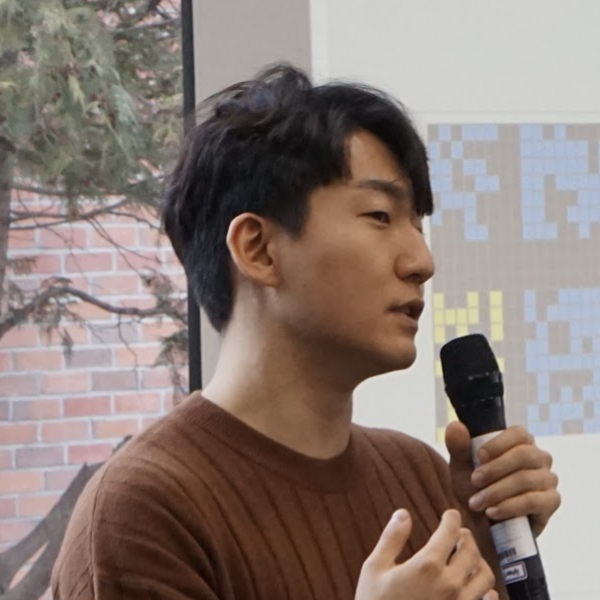Machine Learning and Deep Learning
An introductory course on traditional statistical machine learning. Topics include linear regression, classification, sampling methods, model selection, tree-based methods, support vector machine, survival analysis, hypothesis testing, unsupervised learning, and deep learning. Prior knowledge in basic statistics, linear algebra, and programming (Python) is recommended.
- Time: Mon/Wed 1:00pm-2:30pm (Fall 2024)
- Venue: GIST College Building C (N6), Room 104
- Codes: AI5213 / EC4213 / AI4021 / CT5303 / ET5402 / FE5402
- Size: 102 (51 undergraduates, 51 graduates)
Notice
- HW4 is released (Due: 12/15)
- HW3 is released (Due: 11/24)
- HW2 is released (Due: 10/27 → Extended to 11/1)
- HW1 is released (Due: 9/29)
- Message from the Instructor: On Selecting Courses
- The semester will begin at 9/2. Enjoy your vacation!
- Increased the class size from 70 to 90. In addition, I reserved 10 seats for incoming graduate students.
Useful Links
- Access the AI5213/EC4213 Ed Discussion forum.
- Use your full name in the format “Firstname Lastname” with the first letter of each name capitalized (e.g., Sundong Kim).
- Don’t forget to use your valid email address.
- Submit your assignments at the AI5213/EC4213 Gradescope. Make sure to enter your correct student ID.
- Use the same name format as for Ed Discussion: “Firstname Lastname” with the first letter of each name capitalized.
- Make sure to enter your correct student ID.
Syllabus
The course will utilize presentation slides created by the authors of our textbook. Download all slides.
Staffs
Communication: The course schedule and all resources (e.g. lecture slides) will be posted on this course website. All class discussions, announcements and other communication will take place via Ed Discussion. Use the public comments if your question is relevant to the course material. We aim to respond to questions within 2 business days, often sooner. If you need to contact the course staff, please make a private question on Ed instead of sending a personal email. You’re free to visit TAs during office hours.

Sundong Kim
Instructor
QnA: Available after class (Lecture room)
Office: AI Building (S7), Room 204

Seokki Lee
TA
Mon 7:00-8:00pm
Office: AI Building (S7), 1F Metaverse Studio

Woletemaryam Liyew
TA
Tue 7:00-8:00pm
Office: AI Building (S7), 1F Metaverse Studio

Jihwan Lee
TA
Wed 7:00-8:00pm
Office: AI Building (S7), Room 208

Geonwoo Cho
TA
Thr 7:00-8:00pm
Office: AI Building (S7), Room 208

Hosung Lee
TA
Fri 4:00-5:00pm
Office: AI Building (S7), Room 208
Homeworks
Submit your assignments at the AI5213/EC4213 Gradescope.
- HW 1 is due Sunday, Sep 29 at 11:59PM
- HW 2 is due Sunday, Nov 1 at 11:59PM
- HW 3 is due Sunday, Nov 24 at 11:59PM
- HW 4 is due Sunday, Dec 15 at 11:59PM
Late policy for homeworks: If assignments are late, they are increasingly penalized as follows: within 24 hours, you lose 10%; within 48 hours, you lose 20%; within 72 hours, you lose 40%. More than three days late, you can no longer hand-in the assignment.
Exams
There will be two closed-book exams. You are allowed to bring one handwritten A4 crib sheet (both sides), printed sheets or those created by iPad are not allowed. Submit your crib sheet with your exam sheet for bonus points. For the exams, you may only bring: your student ID, pen, pencil, eraser, and your handwritten crib sheet. No other materials are allowed.(e.g., mobile phone, iPad, laptop, books).
- The midterm will take place on Monday, Oct 28, 1:00pm (Venue: Oryong Hall (W1) #303, 100 minutes)
- The final exam will take place on Monday, Dec 16, 1:00pm (Venue: Lecture Hall (N6) #104 , 120 minutes)
Exams will cover material from lecture, homework, book, and equivalent.
- For midterm, ISLP Ch.1-8 and relevant materials will be covered.
- For finals, ISLP Ch.9-13, Ch.1-8 and relevant materials will be covered.
Exam Conflicts and Makeups: Exam makeups will only be scheduled for approved conflicts. If you have a conflict with any of the exams, let us know as soon as possible. Examples include:
- Acceptable reason for makeup: Presenters at NeurIPS-24 Workshops (Dec 14-15), Funeral of a family member or close relative.
- Unacceptable reason for makeup: Heavy exam schedule on the same day (e.g., having exams Dec 16 9am-12pm and 4pm-7pm).
Gradings
You will earn A if (but not only if) your score is at least \(80\times(1-ε_1)\), B if your score is at least \(60\times(1-ε_2)\), C if your score is at least \(40\times(1-ε_3)\), for some \(ε_i ≥ 0\) to be determined later. All participants in the course (Undergraduate and graduate students) are evaluated equally, regardless of the course codes.
- Four homework (40%, 10% each)
- Midterm (25%)
- Final Exam (35%)
Collaboration Policy & Honor Code
Study groups are allowed. It is also OK to get clarification (but not solutions) from books or online resources, again after you have thought about the problems on your own. However, we expect students to understand and complete their own assignments. Each student must write down the solution independently and hand in one assignment per student, which means you write your solution after closing the book and all your notes, without helped by your colleagues. If you studied together as a group, please cite your collaborators fully and completely at the top of your assignment (e.g., “Junho explained to me what is asked in Question 2.1”). When in doubt about collaboration details, please ask us on Ed discussion.
If elements of two assignments are determined to be clearly very similar, we believe that they were done together or one was copied from the other), then the course grade for all students involved in the incident will be reduced by one letter grade for the first offense, and to an F for the second offense. (All means both the copy-ers and the copy-ees). The grade for that assignment will also be reduced to 0. More serious cases of cheating (e.g., cheating on exams) will lead to severe consequences ranging from a grade of “F” on the class to suspension from the University.
Message from the Instructor
I am happy to lead this course, but having a large number of students can be challenging. Additionally, as this course is relatively new, the course management may be subject to adjustments, and the workload might be unexpected for some of you. The course deals with the basics of traditional machine learning, which might be different from what you’re hoping to study.
To get a better grasp of what you’ll learn in this class, I strongly encourage you to browse through the textbooks, especially the ISLP book. It will give you a good overview of the course content and help you decide if this class aligns with your learning goals.
I would suggest taking the following courses this semester if you are interested in:
- Hands-on practice on deep learning: Take AI5214 (AI Experience Lab)
- Advanced deep learning: Take RT5102 (Advanced Deep Learning)
- Advanced machine learning: Take EC6304 (Pattern Recognition)
- Real-world AI project: Take AI4001 (AI Core Technology Based Project)
- LLM, Cloud, Gen AI: Take AX5301 (Principles and Emerging Technology in AI)
- Fairness and policy: Take AI5750 (인공지능 정책, Korean)
Please consider your interests and goals carefully when deciding whether to take this course or one of the alternatives listed above.

